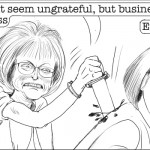The NYE is running a series of Election Special articles on the forthcoming elections to determine who will be the next Police Fire and Crime Commissioner (PFCC) for North Yorkshire on the 6th of May.
The first article covered the background to the PFCC election and the positive achievements of the current PFCC Mrs Julia Mulligan pictured above with the former Home Secretary and former Prime Minister Mrs Theresa May and can be read here: PFCC Election 1.
In this article Tim Hicks continues his assessment of the performance of the current incumbent PFCC Julia Mulligan, since she was first elected in 2012.
2021 PFCC Election Special 2: PFCC Mulligan, an Assessment Part 2
by TIM HICKS
~~~~~
Strengths and weaknesses of the PFCC system
The reasons that the previous system of indirectly elected Councillors from all parties co-opted onto a Police Authority being replaced by a PCC was set out in this speech by Home Secretary Theresa May shortly before the last PFCC elections in 2016: Putting People in Charge: Future of Police & Crime Commissioners.
In this speech Mrs May asserted that PCCs were intended to bring real local scrutiny of Chief Constables and how their forces performed. They would give people the right to have their say in how policing is run in their area, influence priorities ensure crime was taken seriously not unpunished, scrutinise spending and the police budget, have their voice heard on police misconduct and ensure that a Chief Constable that was not delivering would be removed and replaced by someone that would do the job better.
Mrs May emphasised that direct democratic accountability through the ballot box brought real scrutiny, leadership and engagement to local police forces in a way that never existed before. She asserted that if a PCC was believed not to have been performing, he or she could be voted out at the election. Thus giving people control over policing.
However, Mrs May summarised the potential failings of a system of elected PCCs as the potential for:
- Politicisation of the police: Too much power and influence would be put in the hands of one person, leading to a politicisation of the police and an undermining of their independence.
- Political interference in policing: Politically motivated PCCs could interfere in operational investigations.
- Inappropriate relationships with the Chief Constable: The PCCs power to hire and fire Chief Constables could give rise to relationships that were too close and corrupt.
- Inability to cope with the role: PCCs could be overwhelmed by the amount of work and the complexity of it.
In this 2013 interview, one year after the first PCC elections in 2012, the former West Midlands PCC Bob Jones raised other concerns over the possible failings of PCCs:
- Vested political interests: A single person whether an independent or from a political party could appear to be looking after a particular vested interest and cannot represent all the interests in a large, multi-cultural, diversified area.
- Failure to hold the police to account: It is more difficult for an individual politician to assure the community that he or she is effectively holding the police to account on behalf of everyone, which was not the case when this function was performed by a group from all political parties and resected independents, who between them had greater diversity and experience.
These concerns and others not foreseen by Mrs May and PCC Jones have manifested themselves during the tenure of the current PFCC Mrs Julia Mulligan.
This article will focus on the impact Mrs Mulligan’s personal characteristics and experience have had on her performance as PFCC. Article 3 will focus on the impact vested political interests that have affected her performance and her inappropriate relationships with successive Chief Constables.
Inability to cope with the role due to personal failings, which brought the office of PFCC and the Association of PFCCs into disrepute and prevented the efficient running of the Office of the Police Fire and Crime Commissioner (OPFCC)
A disciplinary investigation by the North Yorkshire Police and Crime Panel found that Mrs Mulligan had bullied members of her staff in the OPFCC. Embarrassingly, PFCC Mulligan was also the Association of Police and Crime Commissioners (APCC) lead spokesperson for ethics at the time. Unfortunately this brought the office of PFCC and the APCC into disrepute and ridicule.
This was not the first time that Mrs Mulligan has been accused publicly of misconduct towards her colleagues:
“The hearing comes two months after York Councillor Peter Dew resigned from the panel accusing Mrs Mulligan of treating its members with “little disguised contempt”.”
It cannot be easy to work in the OPFCC for someone like PFCC Mullligan and this may have impacted on the efficiency of the operation of the OPFCC:
- The identity of the person that made the bullying complaint against PFCC Mulligan has never been revealed. It is unclear if he resigned and left, or is still in the OPFCC.
- In addition to the complainant mentioned above whose allegations of bullying by PFCC Mulligan were upheld, three other members of staff supported her allegations and made allegations of bullying against PFCC Mulligan. It is also unclear what happened to them, if they resigned and left, or are still there.
- Ms Joanna Carter who had been the CEO for the PFCC since May 2013, was absent from work due to illness from the 29th of February 2016 and retired on the grounds of ill health on the 28th of February 2018. The cost of her sick pay to the tax payer was about £78,000. This does not include the disruption and extra costs caused by her absence.
- Although Ms Carter retired on the 28th of February 2018, no full time replacement has been found for her. In response PFCC Mulligan has hired three people -a part time Chief Executive and two “Interim Assistant Chief Executive & Deputy Monitoring Officers”. Thereby increasing costs.
The Deputy PFCC Will Naylor has now left and the role is vacant, as are three other roles in the OPFCC, one of which is not disclosed as vacant on the website. Presumably to avoid disclosing that there is an extra person working to assist the part time CEO, Mr Simon Dennis, of whom more below.
Concerning Mr Naylor, according to a media report, he was a Conservative Party policy researcher that worked for a Conservative MP before appointment. He is alleged to have had no suitable experience other than this for the role.
Such is the state of confusion in the OPFCC that it could not publish an accurate staff structure. Estimates of the number of staff varying from 22, to 25, 28, 29 or more.
This causes me some concern:
- There should be complete clarity on authorised roles and staffing in the OPFCC. At the moment there isn’t.
- The OPFCC should not be publishing information that does not disclose the correct number of staff, what duties they perform, conceals vacancies and conceals that an extra member of staff is employed for a role that appears to be unauthorised.
- Some of these roles have been vacant for some time, indicating that they are unnecessary and if this is so, they should be disestablished, to save public money.
- For a well-staffed –some would argue excessively staffed- public body with a duty to be open with the public, this is unacceptable.
I asked PFCC Mulligan to update the website, so it is accurate and reflects the true state of staffing in her office on the 10th of April. I received no response and as at the 17th of April when this article was drafted, the website had still not been corrected.
It must be a concern that PFCC Mulligan’s poor relations with members of her staff has affected the OPFCCs ability to operate effectively.
Inability to cope with the role due to limited experience, leading to failures in financial control and increased costs to the public
North Yorkshire Police has had a series of financial scandals over the past ten years, which have hit the national press. See this NYE article here for a list of them.
No other force has had a similar level of financial scandals. When PFCC Mulligan was elected in 2012 I had hoped she would immediately clamp down hard on Chief Police Officers and we would see an end to the abuses of the public purse that were permitted by the Police Authority. Sadly this did not happen:
- NYP Chief Officers can book travel and accommodation without authorisation. A classic failure of financial control. NYE article here.
- PFCC Mulligan allows the Chief Constable to attend FBI Alumni conferences in various European cities which are of dubious training value and variously include time for banquets, shopping and sight-seeing. In itself, this is not a major item of expenditure, but nevertheless unacceptable, given that taxpayers who are paid far less than Chief Constable Winward, are being forced to pay more tax to fund it.
- The sale of the former NYP Force Headquarters at Newby Wiske Hall, was mishandled, resulting in increased costs. Article here.
- PFCC Mulligan spent thousands of pounds of public money on PR agencies and a communications manager, which has nothing to do with cutting crime, but everything to do with improving her image and that of the police. This Harrogate News article carries a very balanced and full analysis.
- The 2018 HMICFRS inspection of NYP (here) stated
“The force doesn’t have the capability to monitor all IT systems and the data contained within them. As a result, there are gaps in coverage. Recent extra capacity in the professional standards integrity unit is enabling the force to develop proactive processes to look for corruption linked to abuse of position for a sexual purpose by analysing data. But this is in its initial stages. The force should take steps to make sure that data is protected and effective monitoring of technology can take place.”
In November 2019, after a long drawn out process to get to the truth, NYP confirmed that it did not have any date to implement the improvements specified by HMICFRS. This means that any predatory Police Officer or member of staff can access information through the force computer system and use it to target vulnerable adults and children. This is a catastrophic failure of NYP information security that could leave children vulnerable, despite warnings from HMICFRS since at least 2016.
- The PCP initially refused to support PFCC Mulligan’s proposal for an increase in the 2019/20 Police Council Tax Precept, which was incompetently presented and unsupported by any indication of what it would be spent on. PCP statement here. She was the only PFCC to have her budget proposals vetoed.
- It then emerged that the PFCC Mulligan underspent her 2019/20 budget by £600,000 and was asking for an additional increase for 2020/21. Craven Herald article here. NYE article here.
- PFCC Mulligan authorised the expenditure of hundreds of thousands of pounds on civil legal action against journalists, referred to above, which had no benefit for the taxpayer and achieved nothing other than to incur enormous legal costs.
Mrs Mulligan’s biography on the PFCCs website states:
“A former businesswoman, Julia Mulligan was first elected as North Yorkshire’s Police and Crime Commissioner in November 2012 and was re-elected in May 2016. In November 2018 Julia became North Yorkshire Police Fire and Crime Commissioner
Julia has an ambitious programme focussed on improving local policing, customer service and protecting the most vulnerable She also holds a number of national portfolios including chair of the Police Reform and Transformation Board as well as leading the National Rural Crime Network.”
In 2006, Mulligan was elected as the Craven District Council Councillor for Upper Wharfedale. She stood unsuccessfully as the Conservative candidate for Leeds North West in the May 2010 General Election. I have asked Mrs Mulligan for full biographical details of her experience and qualifications but she has refused to provide them.
I suspect that this is because the reality of her business experience is that it is relatively lightweight and has not equipped her to deal with issues of financial control.
Vested political interests resulting in an unsatisfactory PFCC being kept on long after she should have been removed from office
Following the bullying complaint being upheld against her, PFCC Mulligan was subject to criticism in the House of Lords. The Lib Dem Peer Baroness Harris of Richmond, -herself a former Chair of the North Yorkshire Police Authority- is quoted in this excellent Yorkshire Post article by Claire Wilde, as saying she was:
“very concerned that the PCC for North Yorkshire has been allowed to take over the fire and rescue service while still having further charges of bullying brought against her”.
and
“She (PFCC Mulligan) treats people who disagree with her with utter contempt.”
She was speaking in a debate in support of a motion submitted by Liberal Democrat peer Baroness Pinnock, that Mrs Mulligan’s appointment as PFCC would:
“severely impact on the fire service’s capacity to serve residents”.
Baroness Harris went on to state that Mrs Mulligan is unfit for employment as North Yorkshire Police, Fire and Crime Commissioner:
“Until this PCC can understand that leadership means listening to people and taking them with her, rather than bullying them, she is not suitable to hold such a vital office.”
Obviously it is unacceptable to have a PFCC or anyone in public office that indulges in bullying of staff, because quite apart from the impact it has on individuals, it also prevents the efficient running of their office.
In my experience, if a manager in any large commercial organisation was found guilty of bullying and to have attracted adverse parliamentary comment, he or she would be dismissed for gross misconduct. I have no doubt that if PFCC Mulligan had been an Independent, LibDem or Labour PFCC she would have been removed.
However, the Conservative peers in the House of Lords circled the wagons around PFCC Mulligan and the motion was defeated on the basis that it was politically motivated.
The organisation responsible for supervising PFCCs is the North Yorkshire Police, Fire and Crime Panel (PCP), which is dominated by Conservative Councilors. Had they dismissed PFCC Mulligan, it would have revealed that a Conservative PCC had failed as PCC and required an election, putting the Conservatives at an electoral disadvantage.
The Conservatives therefore withdrew her automatic nomination to be the next Conservative candidate for PFCC, effectively de-selecting her. This saddled the people of North Yorkshire with a “lame duck” bully as PFCC from 2019 until 2021, but evaded calling an election that risked having a Labour victory. NYE article here.
PFCC Mulligan decided not to seek adoption as the Conservative party candidate and bizarrely blamed her failure to be adopted as the Conservative Party candidate on attitudes towards women amongst North Yorkshire Conservatives. NYE article here. This illustrates another personal failing, PFCC Mulligan was unable to consider the possibility that her own personal failings could have contributed to her de-selection, or admit any responsibility for the consequences of her actions.
Vested political and personal interests, and inappropriate relationships with successive Chief Constables that are “too close and corrupt” that have resulted in a loss of hundreds of thousands of pounds to the public.
PFCC Mulligan, Mrs Joanna Carter, Mrs Jane Palmer and Chief Constable Dave Jones all voted to authorise £202,000 to commence a civil prosecution for harassment against one individual involved in a complex family fraud and aged abuse case, and NYE journalists Nigel Ward (pictured below) and I. This was after the action had been underway for several months and had already cost £162,406.
Mrs Mulligan’s decision notice authorising the action (here) conveniently omitted to mention that the funds had been authorised to obtain an injunction preventing coverage of North Yorkshire Police by the NYE, costs and damages, or that all four individuals that authorised the expenditure had a vested personal interest and stood to gain from the action:
- Chief Constable Jones (along with Chief Constable Winward, Chief Constable Madgwick and a retired police officer) would all make thousands of pounds from damages.
- Ms Palmer was the Chief Constable’s Chief Finance Officer at the time the NYE broke the Chief Officers’ expenses scandal by revealing that about a hundred thousand pounds of taxpayers’ funds had been siphoned off to Chief Constable Maxwell and Deputy Chief Constable Briggs without any justification or payment of tax. Yorkshire Live article here. Ms Palmer ignored my questions over this scandal. Obtaining an injunction would prevent me from performing any further legitimate scrutiny of her role in the scandal, or criticising the performance of her department.
- Ms Carter was the CEO at the time of the Chief Officers expenses scandal and had also suffered legitimate criticism from me over her expenses. Like Ms Palmer, she had maintained her right to silence and failed to respond to my questions. By obtaining an injunction she would conveniently be able to prevent any further questions on her role in the Chief Officers expenses scandal, or how she was also able to obtain expense payments without disclosing what the payments were for. (This is to be covered in a subsequent article).
- PFCC Mulligan had been the subject of criticism in the NYE from 2013 onwards. By obtaining an injunction PFCC Mulligan would prevent any further embarrassing disclosures about North Yorkshire Police, the Jimmy Savile and Peter Jaconelli paedophile ring, Chief Officers expenses, her own conduct, or that of her office.
Further, PFCC Mulligan’s fellow Conservative Party politician, Councillor Jane Kenyon (subsequently Councillor Jane Kenyon-Miller) who was chair of the Police Authority when the payments to Briggs and Maxwell were made was also provided with funding for the High Court action. Yet this is not mentioned anywhere in the decision notice.
Councillor Kenyon-Miller was a contemporary of the Conservative Party Councillor and Mayor of Scarborough Peter Jaconelli whom the NYE exposed as a paedophile and rapist. Councillor Kenyon-Miller must have known of the allegations about him, but did nothing about it. She had also been subject to entirely legitimate criticism in the NYE and national media (see below). By obtaining an injunction, PFCC Mulligan would have prevented any further scrutiny of Councillor Kenyon-Miller and prevented any further damage to her party’s interests in Scarborough.

Councillor Kenyon-Miller subsequently submitted a statement to the High Court requesting that journalists should be prosecuted for harassment, because she believed that the NYE was partially responsible for her losing her seat for Mayfield Ward in the May 2015 local government elections. If this had been upheld, it would have extended the law on harassment to render every political journalist in the country liable for arrest if any politician disliked with their coverage. But it would nevertheless have removed the NYE’s ability to criticise Scarborough Conservatives, thereby securing a political advantage for PFCC Mulligan’s party.
Incredibly, PFCC Mulligan, Mrs Joanna Carter, Mrs Jane Palmer and Chief Constable Dave Jones did not recuse themselves. Nor did they insist that the decision notice be amended so that it disclosed these conflicts of interest and that police funds were being provided to a Conservative politician.
The action taken against the NYE journalists was clearly disproportionate. The benefit to the taxpayer -even if NYP had won would have been nil. However, if successful the injunction would have gagged a media outlet that was legitimately criticising the police and PFCC Mulligan and made Chief Constables and a Conservative politician an enormous personal windfall from damages.

Vested political interests and personal failings, resulting in an inability to maintain good media relationships, inform the public or hold the police to account
The PFCC has a primary duty to hold the police to account. The media shares this duty and the PFCC should support this and respect the role of journalists in holding public bodies to account.
The NYE is the only local media outlet in North Yorkshire that has been effective in holding the police, police authority and PFCC to account. Witness the list of scandals it has exposed. However, far from embracing the media, PFCC Mulligan and her staff have operated a deliberate policy of media suppression of the NYE and withholding information from the public, which has been coordinated with the Chief Constable.
On the 3rd of January 2019, I received an e mail from a member of PFCC Mulligan’s staff telling me that the OPCC would no longer recognise me as a journalist and would not respond to media enquiries from me. I later received a letter from the OPFCC’s lawyer stating that:
“In accordance with the Commissioner’s policy on unreasonable and unacceptable complainants and the IOPC statutory guidance on handling complaints, we are writing to advise you that the volume of your correspondence is excessive, unreasonably persistent and that (whilst some correspondence is appropriately raised with this office and the complaints team) the nature of your correspondence is often unreasonable, derogatory containing unsubstantiated allegations/assertions, or constitutes ineligible purported complaints. Your behaviour in corresponding in this manner is unacceptable due to the substantial impact that responding to you alone has on public resources.”
The Chief Constable also sent similar letters, demonstrating that far from holding the police to account, PFCC Mulligan was participating in a jointly agreed media strategy with the police to cut off contact with the NYE. Thereby denying it access to police information and inhibiting the media’s ability to hold the Police to account.
A classic example of “cancel culture”.
Nor is the NYE the only media outlet that has had difficulties with PFCC Mulligan. This Harrogate News article asserts that PFCC Mulligan has an:
“indifferent relationship with many of the regional media outlets”.
The public have a right to know how their money is spent. The media have a duty to hold public bodies to account and inform the public.
Suppressing the media in retaliation for criticism and withholding information prevents the public knowing how their money is spent and how public bodies are performing. Information they are entitled to have. A few examples
- Baroness Harris was quoted in the House of Lords during the debate on PFCC Mulligan that:
“Indeed, it appears that she has led North Yorkshire Police into its worst financial crisis since the millennium.”
There is a £10m shortfall this financial year, which may come as a surprise to the people of North Yorkshire as there has been no public acknowledgement of this gathering storm.”
[My emphasis in bold]
The £10m shortfall was unknown because of the lack of any public statement about this by PFCC Mulligan. In short, it appears it was deliberately kept quiet and withheld from the public.
- PFCC Mulligan will not allow the witness statements or documents from the legal action she authorised against Nigel Ward and me to be released into the public domain. Thereby denying the people of North Yorkshire the opportunity of judging for themselves if her use of their money was remotely justifiable.
- PFCC Mulligan’s media statement made concerning the High Court action against journalists Nigel Ward and I does not mention that public funds had been provided to a wealthy conservative politician (here). Information the public had a right to know.
Clearly this is unacceptable in a democracy, particularly from a public servant that has a duty to be transparent.
PFCC Mulligan, Chief Constable Winward and Councillor Carl Les, Chair of the PCP were provided with a draft copy of this article and asked for a comment, but none was received by the time the article went to press.
Right of Reply
If you are mentioned in this article and do not agree with the views expressed in it, or if you wish to correct any factual inaccuracy, please let me know using the letters@nyenquirer.uk e mail address and your views and a correction will be published if appropriate.



























Comments are closed.